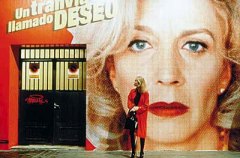All About My
Mother
aka Todo Sobre Mi Madre
|
| |
 |
Spanish
language. Spain/France, 1999. Rated R. 105 minutes.
Cast: Cecilia Roth, Marisa Paredes,
Penélope Cruz, Candela Peña, Antonia San Juan, Rosa Maria Sardà,
Toni Cantó, Eloy Azorín
Writer: Pedro Almodóvar
Music: Alberto Iglesias
Cinematographer: Affonso Beato
Producer: Agustín Almodóvar
Director: Pedro Almodóvar
|
| Grade: A- |
Review
by Jeff Vorndam |
 would
rather present a slide show of stills from All About My Mother than sully
it with a written review. However, because I get paid $100 a word from the benevolent
site administrator, pictures be damned and hearken ye to paragraph upon paragraph
of unevocative description. It’s disheartening that I cannot convey the passion
displayed in every moment of All About My Mother. Director Pedro Almodóvar
clearly loves his subjects – women, mothers, actresses, and actresses who play
actresses. Each frame gushes with beauty. The film would be garish if it weren’t
supported by worthy characters whose experiences inspire anguish, hope, and
laughter. Instead, All About My Mother is bold and lively filmmaking,
which plumbs jewels from cinema’s past and builds on them to resonate in new
directions.
would
rather present a slide show of stills from All About My Mother than sully
it with a written review. However, because I get paid $100 a word from the benevolent
site administrator, pictures be damned and hearken ye to paragraph upon paragraph
of unevocative description. It’s disheartening that I cannot convey the passion
displayed in every moment of All About My Mother. Director Pedro Almodóvar
clearly loves his subjects – women, mothers, actresses, and actresses who play
actresses. Each frame gushes with beauty. The film would be garish if it weren’t
supported by worthy characters whose experiences inspire anguish, hope, and
laughter. Instead, All About My Mother is bold and lively filmmaking,
which plumbs jewels from cinema’s past and builds on them to resonate in new
directions. 
The heart of All About My Mother is Cecilia Roth. She plays Manuela,
a nurse at an organ-transplant clinic who acts in medical training videos detailing
the organ-transplant process (she plays the distraught mother). Manuela possesses
the beauty of experience. Her hardships are worn on her face, but rather than
projecting a beaten-down portrait, Roth imbues the sad knowingness in her eyes
with a tremendous compassion and vitality. It’s a performance that anchors the
film perfectly, as she embodies the remarkable traits in women that Almodóvar
finds fascinating. Manuela is the mother of Esteban (Eloy Azorín), half her
age and just turning eighteen. For his birthday, she gives him Truman Capote’s
Music for Chameleons, from which he reads, “When God hands you a gift,
he also hands you a whip; and the whip is intended solely for self-flagellation."
Esteban is a budding writer who is given the inspiration to write a piece on
his mother called “Todo sobre mi madre” after he watches Joseph Mankiewicz’s
classic All About Eve with Manuela. Their bond is so close that they
seem almost to be one. When Esteban asks Manuela to grant him a birthday wish
to know more about his absent father, she refuses. The time is not right, she
feels. In reality, she has run away from her past and never wants to look back.
On Esteban’s birthday, Manuela and Esteban go to see a production of A Streetcar
Named Desire starring the diva Huma Rojo (Marisa Paredes) as Blanche. Like
All About Eve, Tennessee Williams’ play is a running theme throughout
the movie, particularly its closing line, “I have always depended upon the kindness
of strangers.” Esteban is enraptured by Rojo’s performance, and he convinces
Manuela to stay with him after the show (in a torrential downpour) to obtain
the actress' autograph and speak with her (shades of Anne Baxter in All About
Eve). Rojo is in a hurry though and is off in her car before Esteban can
reach her, though she notices him through her window as she speeds off. Esteban
is left out in the middle of the street. We can see what will happen next, yet
it is no less powerful for our knowledge. In a stunning scene, Esteban is struck
by a car and killed. The camera rests beside his body and the rain pounds down.
Manuela appears in the frame, overwhelmed with grief, her bright red overcoat
accentuating her tragedy in its incongruity. She doesn’t learn he’s dead until
she’s at the hospital. The most heartbreaking scene in the movie is when the
doctors must inform her that her son has died. Having acted the grieving parent
for the video production so many times, Manuela knows as soon as they pull up
their chairs. Her pre-emptive anguished cry stabs outward as she realizes she
is now alone. 
These first twenty-five minutes are perfect, but I wondered where the
film would go from there. A more predictable film would languish in ennui,
as the mother would desolately try to relate to others in the absence of
her son. Or perhaps she would secretly follow the young man who receives
Esteban’s heart transplant. Instead, Almodovar wisely chooses a change
of locale for Manuela. She leaves Madrid for Barcelona, the city she fled
18 years before when she carried Esteban inside her. Manuela goes to look
for Esteban’s father, formerly named Esteban also, but who now goes by
Lola since ‘he’ became a ‘she.’ If Manuela cannot indulge her son’s last
wish to meet his father, at least she can let his father (whom she describes
as the “worst of a man, and the worst of a woman”) meet their son. She
looks for Lola at a hang-out for prostitutes called “The Field,” where
she runs into the delightfully outrageous La Agrado (Antonia San Juan),
an old friend of theirs from the whoring days. Agrado, whose name means
“agreeable” as she often points out, is a transsexual prostitute who provides
the film’s comic relief and delivers its linchpin monologue.
AboutFilm.Com
The Big Picture
|
| Carlo |
A-
|
| Alison |
A-
|
| Kris |
C
|
| Jen |
-
|
| Dana |
A-
|
| Jeff |
A-
|
Agrado introduces Manuela to Sister Rosa (Penélope Cruz), a nun who
works at a shelter. Like Agrado and Manuela, she has her problems, and the three
bond in scenes of dialogue that Almodovar theorizes is the essence of life–the
ability for women to align with each other. As Manuela begins building a surrogate
family of sorts, she runs into Huma Rojo again. She becomes an assistant to
her, as Rojo and her lover Nina share a tempestuous relationship that occasionally
requires Manuela to substitute for Nina’s Stella in the production of Streetcar.
It turns out that Manuela and Lola had played Stella and Stanley in Streetcar
twenty years earlier, and her return to the role and its signature line about
the kindness of strangers, now carry a greater meaning. Almodovar’s larger meaning
is the appreciation of a woman’s capacity to act in everyday life. She is always
acting, playing roles, be it mother or lover. Her acting keeps her grounded
during tragedy. It provides a buoy for others to cling to, and a method by which
to regroup.
Though All About My Mother, in the course of its story, takes us through
familiar conventions like the death of a loved one and the birth of a new baby,
it manages to feel new. Almodovar tells his story in a way that convinced me
it was the first time I’d heard it. When it ended, I wanted more. In retrospect
though, the film ends on a perfect note. The key line in Agrado’s wonderful
monologue onstage the night the cast is unavailable is, “a woman is more authentic
the more she looks like what she has dreamed for herself.” This is not simply
in respect to her physical self, but also applies to her emotional terrain.
When the curtain closes on All About My Mother, Manuela has crafted herself
into a mother once again, a part she was born to play.
Review
© December 1999 by AboutFilm.Com and the author.
Images © 1999
Sony Pictures Classics. All Rights Reserved.



